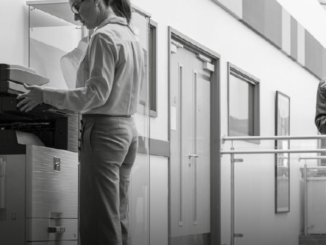
Managed services’ aren’t just about print, or IT solutions, the term can cover a range of high-use products – including sanjan. Automating the process of restocking these items is set to grow in popularity in the coming years
With COVID restrictions now completely lifted in England, and with the other UK nations set to follow soon, there will be more people returning to the office this year. However, employees’ expectations of workplaces have changed during the pandemic and many now expect offices to be cleaner and more hygienic than, perhaps, was the case prior to the pandemic – especially as COVID-19 hasn’t gone away and remains a worry for some.
Indeed, according to a 2020 research study by Kantar, commissioned by global hygiene and health company Essity, following COVID-19, seven-out-of-10 employees expect their employer to provide extra cleaning rounds. However, as Suzanne De Maine, regional marketing manager, commercial and public interest, Essity Professional Hygiene at Tork, points out, this puts extra pressure on office managers.
“Moving towards hybrid working increases the need for flexibility within the workplace and facilities management,” she says. “Coupled with the expectation of improved hygiene and sustainability practices within office spaces, facilities managers face more pressure than ever to meet the needs of workers.”
Providers of facilities services can support dealers with innovative solutions to help office and facilities managers take the steps forward that are demanded. Increasingly, software as a service (SaaS) is being used in this process to automatically restock washrooms and the like, which improves efficiency for customers – taking repetitive processes away from office managers and ensuring there are no gaps in supply. As SaaS technology becomes more accessible, this is likely to become more common, and dealers should be looking to this as a part of their service offering.
For example, data-driven cleaning solutions, which use real-time data to help customers to understand when and where there are cleaning needs in facilities, to easily adjust to changing hygiene protocols, are becoming popular, says Suzanne. “By working with an FSC [facilities services company] this data can be used to optimise hygiene regimes and ensure spaces are always sanitised for use and dispensers are well-stocked.”
Increasing popularity
Non-tech managed services such as this look set to become more popular in the coming years. Tim Beaumont, chief executive of Nemo Office Club, believes that enabling the group’s members to offer services beyond the basic sale of products has been a key part of the company’s tool kit for some time. “These are the areas where dealers can build long-lasting relationships and minimise the threat from competitors – in particular, online multi-nationals,” he says.
“Our expectation is that the opportunities to provide these services will increase in 2022, and so they should; recurring business generates guaranteed income; we have dealers with up to 30% of their income already coming from a recurring business model.
“Our members can access service agreements covering everything from secure IT equipment removal, networking, telephone systems, shredding services and recycling through to contract cleaning, parcel delivery and even leasing arrangements for customers looking to finance a large investment – refitting an office, for example. Increasingly popular is the leasing of coffee and water machines. Regular visits to replenish provide an opportunity to discuss other requirements whilst on the premises.”
However, Tim warns that while digitisation is making it easier to add services, there needs to be a fine balance to ensure the local, personal service that makes dealers unique is not lost. “If a dealer is going to win the full basket of business, it needs to maintain that relationship that gives the customer reassurance,” he says. “Since launching the Keep It Local campaign our members have seen the growing importance of this; it has enabled them to open doors into other services.
“In many ways a dealer’s offering is about making the life of a customer easier, and automating some of the supplies will help that. We are working on the concept of a predictive ordering pad system that would allow a dealer to contact a customer with a ready-completed order, featuring regular purchases, which the customer can then make amends/additions to before returning. Simple, effective and maintaining relationships.”
Sustainable solution
As well as making life easier for customers, it can also help those that are looking for more sustainable solutions, which is another key concern for office workers. A recent survey of 2,000 office workers found that 46% believe the introduction of green initiatives in their workplaces is an ‘afterthought’, while six-in-10 claim employees are left to take the lead on such matters.
To this end, Tork has introduced Tork PaperCircle® which the company says is the world’s first paper hand towel recycling service. “By working in collaboration we can enable businesses to ‘go circular’ by collecting and recycling used paper hand towels into new tissue products – turning waste into a resource,” explains Suzanne.
Suzanne points to a pilot project in Germany and the Netherlands found that Tork PaperCircle® helped to meet sustainability targets by reducing waste by at least 20%; this cut the carbon emissions for paper hand towels by up to 40%, based on a Life Cycle Assessment for Europe, where the avoided processes have been considered. This was conducted by Essity and verified by IVL, Swedish Environmental Research Institute Ltd, 2017.
“It is a powerful statement for customers of their commitment to sustainability – both for visitors and employees,” Suzanne says.


Be the first to comment